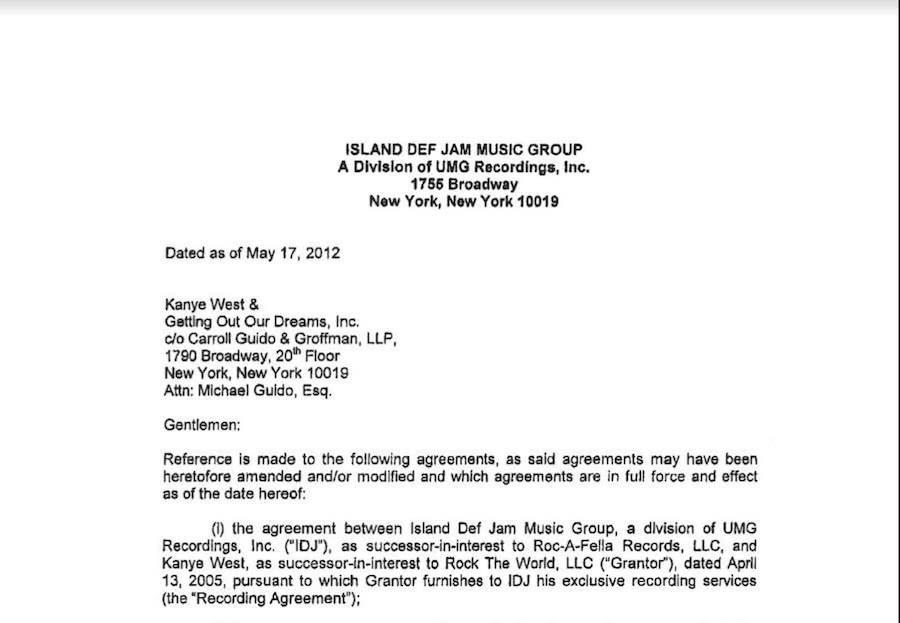We explain Kanye West’s record deal

Two of the most complicated things on earth are the inner workings of Kanye West’s mind and the drafting of record industry contracts. Those worlds collided when Kanye, pursuing his campaign to own the master recordings of all his songs, tweeted out 100 or so pages of his recording contracts.
Here’s what the documents reveal, without all the lawyer language
The players are Kanye, his production company Rock the World and the record companies: originally Roc-A-Fella Records (RAF), then The Island Def Jam Music Group (IDJ, a division of Universal Music).
There are three key elements to any recording contract: who owns the “rights” (meaning copyright in the master recordings); what the royalty rate is (the percentage of sales revenue paid to the artist); and how much are the advances (money paid to the artist before the album is completed, in anticipation of royalties).

Kanye West’s Universal contract
Kanye had originally been signed in 2002, but we don’t know what that contract said. It was replaced in 2005 with a new contract between him and RAF, following the massive success of his debut album College Dropout. It gave RAF options over his next six records.
Critically, RAF took the rights to all of these albums, meaning it would own the copyright forever. In return (apart from paying all the production costs), it promised Kanye advances ranging from $650,000 to $3.5m per album, and royalties of between 14-18% on US sales (and up to 90% in other countries).
That was a very solid deal for a new artist, even one with a big hit already banked. The fact that the record company took the rights is standard.
There were then various amendments to the 2005 contract, agreed at various times in following years.
In 2011, a one-off agreement was signed covering a duet album with Jay-Z, which became Watch the Throne. Kanye got a $2.5m advance and a 15% royalty rate.
In 2012, the game changed radically with a string of amending agreements. Kanye was up to his 6th (Yeezus) and 7th (Life of Pablo) albums, for which IDJ agreed to give him advances of $12m and $6m respectively, along with a much higher royalty of 22%.
At the same time, there was a new contract for his 8th and 9th albums, Ye and Jesus is King. The advances on these were much lower.
The big shift in 2012 was that Kanye was acknowledged as the copyright owner of all four albums (immediately for the 8th and 9th albums, seven years later for the 6th and 7th ), entitling him ultimately to a dramatically higher share of the end profits.
Further agreements made in 2013 and 2014 gave additional incremental advantages to Kanye, reflecting the continuing power balance shift between him and the record company. By the end of all this, he was in a very strong position contractually and financially.
The unfinished business is the rights to Kanye’s first five albums, which remains with the record company. Presumably Kanye’s run out of negotiating options, or is just frustrated by their progress, and has chosen to take his plea for ownership of his own work to the court of Twitter and his 30 million followers.
Kanye’s motivations, like the meaning of his lyrics, are anyone’s guess. One thing for sure: compared to almost every other artist ever, he’s already on a pretty sweet deal.
This article originally appeared on The Industry Observer, which is now part of The Music Network.






























